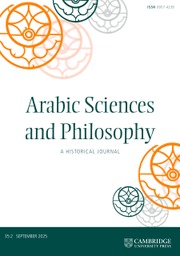Article contents
Notes on Avicenna's Concept of Thingness (šay'iyya)
Published online by Cambridge University Press: 21 May 2002
Extract
Did classical kalām debates about how thing (šay') and existent (maw[gcaron]ūd) relate to each other pave the way for Avicenna's distinction between essence (māhiyya) and existence (wu[gcaron]ūd)? There are some indications that the concept of thingness (šay'iyya) may have played a bridging role between the mutakallimūn's discussions and those of Avicenna. Nevertheless, Avicenna's appeals to thingness occur most densely in passages devoted to analyzing the relationship between efficient and final causes, an entirely Aristotelian topic. A philological question arises: should these passages be emended to read causality (sababiyya) in place of thingness (šay'iyya)? I argue that the balance of evidence compels us to retain thingness. For Avicenna, thingness is the respect in which the final cause is prior to the efficient cause (as well as to the formal and material causes); existence, by contrast, is the respect in which the efficient cause is prior to the final cause. In fact, over the course of Avicenna's career a progression from the kalām problematic of šay' v. maw[gcaron]ūd to his own problematic of māhiyya v. wu[gcaron]ūd can be detected in his discussions of efficient and final causation.
- Type
- Research Article
- Information
- Copyright
- © 2000 Cambridge University Press
- 12
- Cited by




